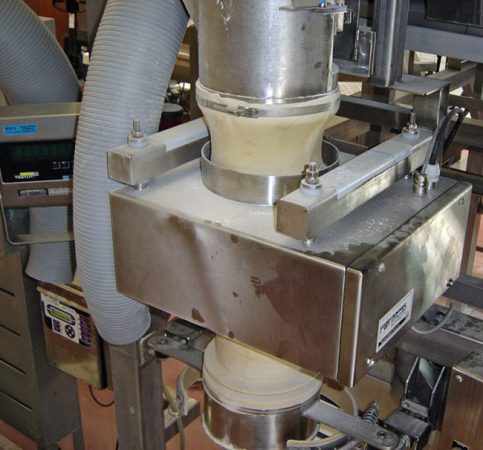
The halo effect
Canadian Packaging
Food Safety Metal Detection Fortress Technology Ltd. HaloLeading metal detection systems manufacturer taking the stress from periodic system testing with a handy automatic testing device
As a general rule, most food manufacturers test each metal detector within their factory at the start and end of the production shift, and then throughout the day at regular intervals—typically on an hourly basis.
In many settings, as soon as one check is done, it is time to start over.
This time spent running and documenting tests on every line where a metal detector is installed can cost a business over several thousand dollars a month per line in machine downtime and human resources.
For larger factories with multiple lines and metal detection units, the monthly expenditure can run into tens of thousands of dollars.
Not only is this unproductive, it makes even the leanest manufacturing operation less profitable.

Automatic test technology can be fitted to bulk, gravity, pipeline, and conveyor-style metal detectors.
To address this inherent shortcoming, while maintaining full data integrity, Toronto-based Fortress Technology Ltd. has developed Halo automatic testing technology—an automatic metal detector testing device designed to automatically test ferrous, non-ferrous and stainless steel samples on all Fortress metal detectors.
According to Fortress, Halo works by effectively duplicating the signal disturbance that occurs during manual testing, without having to physically pass a metal contaminant through the metal detector.
The device automatically generates a signal calibrated to specified sphere sizes, logging the test results to provide a reliable audit trail, while checking the performance of the reject system.
Traditionally installed on the pipeline and gravity metal detectors that inspect free-falling products—including rice, sauces, cereals, powders, corn, sugar and snack foods—the latest release of Halo (Halo 2) has now been adapted to work with a conveyor-style metal detector to further reduce operational costs, while forming a vital part of manufacturing due diligence. For a modest upfront investment, food factories can significantly narrow the time window
during which a problem with a system goes undetected, according to Fortress, by providing traceable and auditable way to periodically test the performance of their food metal detectors.
This in turn reduces the number of suspect products that must be discarded or recalled in case of an incident, says Fortress, estimating the payback time for a new Fortress metal detector fitted with Halo at less than 12 months.
Designed to complement manual testing, automatic testing not only makes good business sense, but its robust audit trail also helps to strengthen food safety compliance and metal detector system security on processing and packing lines.
Advertisement

